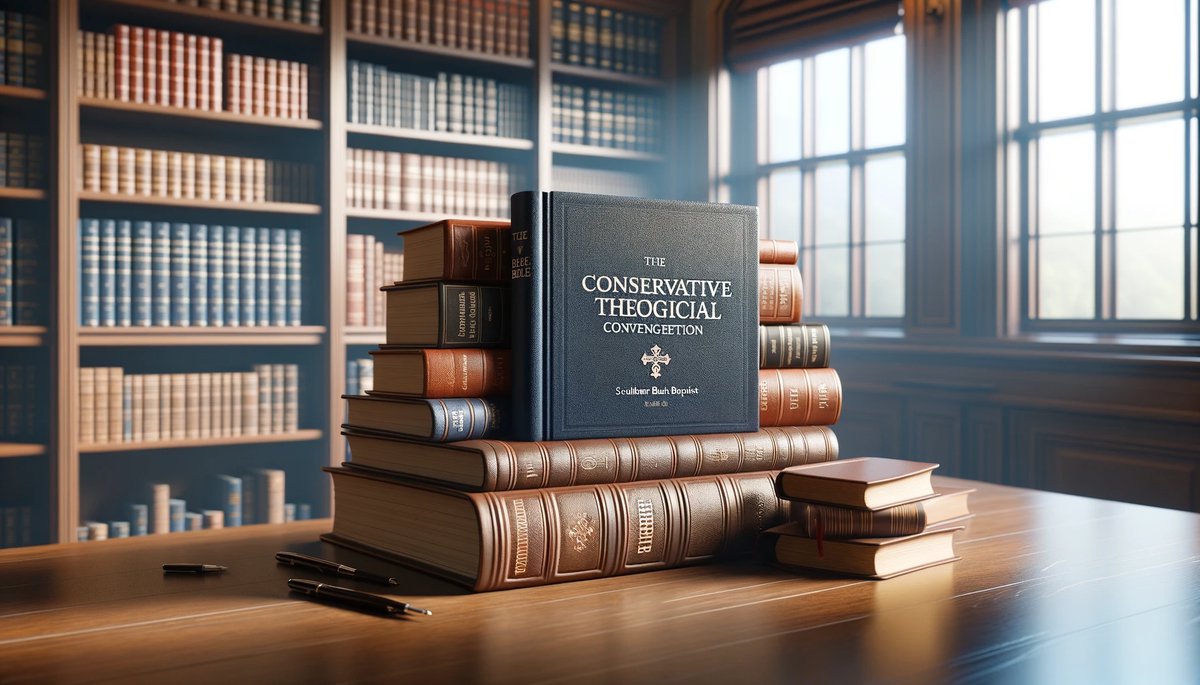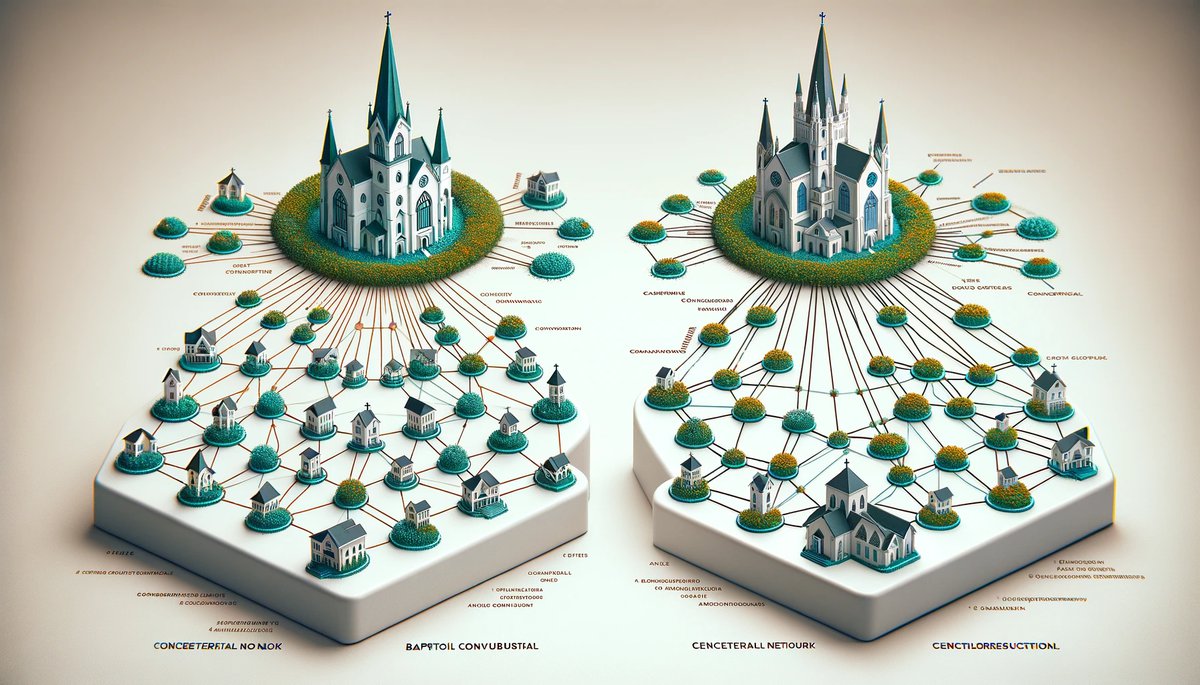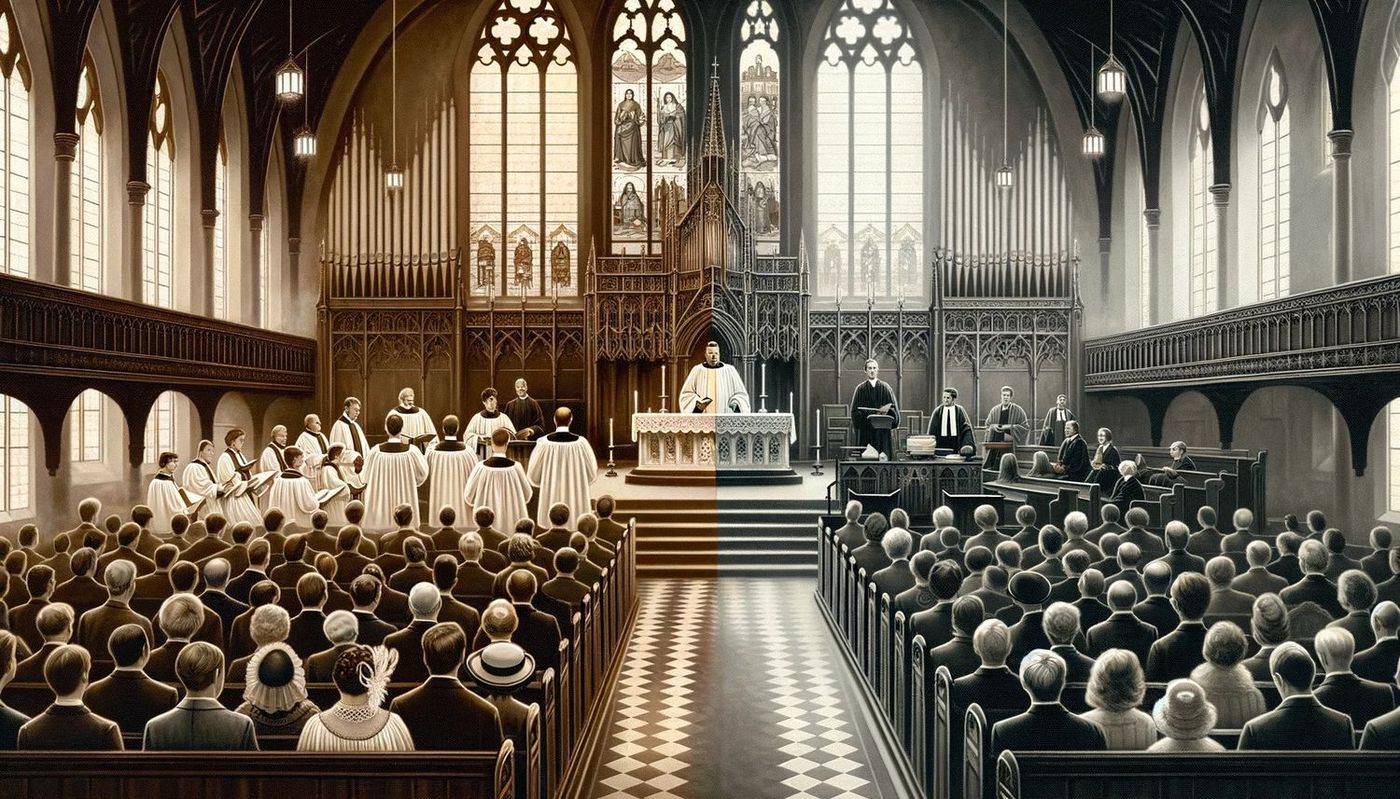Home>Theology and Spirituality>What Is The Difference Between Baptist And Pentecostal Beliefs


Theology and Spirituality
What Is The Difference Between Baptist And Pentecostal Beliefs
Published: February 20, 2024
Ericka Andersen, an editor at Christian.net, expertly merges digital strategy with content creation, focusing on faith and societal issues. Her communication skills enhance the platform's engaging narratives, fostering meaningful dialogue on belief's impact on society.
Discover the contrasting beliefs of Baptists and Pentecostals in theology and spirituality. Explore the differences in their doctrines and practices.
(Many of the links in this article redirect to a specific reviewed product. Your purchase of these products through affiliate links helps to generate commission for Christian.net, at no extra cost. Learn more)
Table of Contents
Introduction
Baptist and Pentecostal beliefs are two distinct branches of Christianity, each with its own unique theological perspectives, worship practices, and spiritual experiences. While both groups share a common foundation in the Christian faith, they diverge on various doctrinal and practical aspects, giving rise to differences in their religious expressions.
Understanding the disparities between Baptist and Pentecostal beliefs is essential for gaining insight into the diverse landscape of Christian theology and spirituality. By exploring the historical roots, core tenets, and worship traditions of these two denominations, we can appreciate the rich tapestry of Christian faith and the nuanced ways in which it is lived out in different communities.
In this article, we will delve into the historical background of Baptist and Pentecostal beliefs, examining the key events and movements that have shaped their development. We will then explore the core beliefs of each tradition, shedding light on their theological emphases and doctrinal distinctives. Additionally, we will investigate the differences in worship practices, the varying perspectives on baptism and communion, and the nuanced understandings of the Holy Spirit within these two Christian traditions.
By delving into these aspects, we aim to provide a comprehensive overview of the differences between Baptist and Pentecostal beliefs, offering readers a deeper understanding of the theological, spiritual, and practical dimensions that set these two traditions apart. Through this exploration, we can gain a greater appreciation for the rich diversity within the Christian faith and the myriad ways in which individuals and communities engage with their religious convictions.
As we embark on this journey of discovery, we invite you to open your hearts and minds to the fascinating world of Baptist and Pentecostal beliefs, where ancient truths intersect with contemporary expressions of faith, and where the pursuit of spiritual understanding continues to inspire and enrich the lives of believers around the globe.
Historical Background of Baptist and Pentecostal Beliefs
The historical roots of Baptist beliefs can be traced back to the 17th century, amidst the backdrop of the Protestant Reformation. Emerging from the radical reform movements in England, Baptists emphasized the principles of believer's baptism and the autonomy of local congregations. Their commitment to individual conscience and the separation of church and state set them apart within the broader landscape of Protestantism. The Baptist tradition flourished as it spread to the American colonies, where it became a prominent force in shaping religious and civic life.
On the other hand, Pentecostal beliefs have their origins in the early 20th century, marked by the Azusa Street Revival in Los Angeles. This movement, led by figures such as William J. Seymour, emphasized the experience of baptism in the Holy Spirit and the manifestation of spiritual gifts, as described in the New Testament. The outpouring of charismatic experiences, including speaking in tongues and divine healing, became defining features of Pentecostal spirituality. This movement rapidly expanded, giving rise to diverse Pentecostal denominations and influencing global Christianity in profound ways.
The historical trajectories of Baptist and Pentecostal beliefs reflect the dynamic interplay of theological, social, and cultural factors that have shaped the development of these traditions. While Baptists have deep historical ties to the Protestant Reformation and the early modern period, Pentecostalism represents a more recent expression of charismatic renewal within the broader Christian landscape. Both traditions have contributed significantly to the tapestry of Christian history, leaving indelible marks on the religious consciousness of millions of believers worldwide.
Understanding the historical background of Baptist and Pentecostal beliefs provides valuable insights into the diverse paths that have led to the formation of these distinct Christian traditions. By appreciating the historical contexts in which these beliefs emerged and evolved, we can gain a deeper appreciation for the rich tapestry of Christian history and the enduring impact of these traditions on the global Christian community.
Core Beliefs of Baptists
Baptists hold a set of core beliefs that define their theological framework and shape their religious practices. These beliefs are central to Baptist identity and serve as foundational principles that guide their understanding of God, salvation, and the Christian life.
-
Sola Scriptura: Baptists adhere to the principle of sola scriptura, emphasizing the supreme authority of the Bible in matters of faith and practice. They view the Scriptures as the inspired and infallible Word of God, providing the ultimate guide for belief and conduct. This commitment to the primacy of the Bible underscores the Baptist commitment to scriptural integrity and fidelity to biblical teachings.
-
Believer's Baptism: One of the distinctive beliefs of Baptists is their practice of believer's baptism, which entails baptizing individuals who have made a personal profession of faith in Jesus Christ. Baptism is viewed as an outward expression of one's inward commitment to Christ and is typically administered through immersion, symbolizing the believer's identification with the death, burial, and resurrection of Jesus.
-
Priesthood of All Believers: Baptists affirm the priesthood of all believers, emphasizing the direct access that every believer has to God through Christ. This belief underscores the individual's responsibility to engage with God personally, participate in the life of the church, and exercise spiritual gifts for the edification of the body of Christ.
-
Autonomy of the Local Church: Baptists uphold the autonomy of the local church, affirming the independence and self-governance of each congregation. This principle grants individual churches the freedom to make decisions regarding their beliefs, practices, and mission, without external hierarchical control.
-
Salvation by Grace through Faith: Central to Baptist theology is the belief in salvation by grace through faith in Jesus Christ. Baptists affirm the unmerited nature of God's grace, emphasizing that salvation is received through personal faith in Christ's atoning work on the cross, apart from human effort or merit.
-
Separation of Church and State: Baptists historically advocate for the separation of church and state, advocating for religious freedom and the autonomy of the church from government interference. This belief reflects a commitment to individual conscience and the freedom to practice one's faith without coercion or persecution.
These core beliefs form the theological bedrock of Baptist identity, shaping their ecclesiology, soteriology, and hermeneutical approach to the Christian faith. They underscore the distinctive emphases of Baptist theology and serve as enduring pillars that have defined the Baptist tradition throughout its rich history.
Core Beliefs of Pentecostals
Pentecostals adhere to a set of core beliefs that distinguish their theological framework and inform their spiritual practices. These beliefs are fundamental to Pentecostal identity and serve as guiding principles that shape their understanding of God, the Holy Spirit, and the Christian life.
-
Baptism in the Holy Spirit: A defining belief of Pentecostals is the experience of baptism in the Holy Spirit, often accompanied by speaking in tongues. This experience, as described in the New Testament book of Acts, is seen as empowering believers for witness and service, and as a distinct event subsequent to conversion. The baptism in the Holy Spirit is viewed as a transformative encounter that equips individuals for spiritual empowerment and ministry.
-
Charismatic Gifts: Pentecostals emphasize the ongoing operation of charismatic gifts, such as prophecy, healing, and speaking in tongues, within the life of the church. They believe that these gifts, as outlined in the New Testament, are essential for edifying the body of Christ, demonstrating God's power, and advancing the kingdom of God on earth. The exercise of charismatic gifts is integral to Pentecostal worship and communal life.
-
Divine Healing: Pentecostals affirm the belief in divine healing, viewing it as a provision of God's grace for physical, emotional, and spiritual restoration. They emphasize prayer for healing and the laying on of hands as means through which God's healing power is manifested in the lives of believers. This belief reflects a deep reliance on God's supernatural intervention in addressing human suffering and infirmity.
-
Eschatological Hope: Pentecostals hold a fervent eschatological hope, anticipating the imminent return of Jesus Christ and the consummation of God's kingdom. This belief shapes their outlook on the future and informs their commitment to evangelism, social justice, and spiritual readiness in light of the anticipated return of Christ.
-
Holiness and Sanctification: Pentecostals emphasize the pursuit of holiness and sanctification as essential aspects of the Christian life. They believe in the ongoing work of the Holy Spirit in transforming believers, enabling them to live lives that are set apart for God's purposes and characterized by moral and spiritual purity.
These core beliefs form the theological foundation of Pentecostal identity, shaping their pneumatology, eschatology, and ecclesiology. They underscore the distinctive emphases of Pentecostal theology and serve as enduring pillars that have defined the Pentecostal tradition throughout its history.
Differences in Worship Practices
The worship practices of Baptist and Pentecostal traditions reflect their distinct theological emphases and spiritual expressions. While both traditions share a commitment to honoring God through corporate worship, prayer, and the proclamation of the Word, their approaches to worship diverge in several key aspects.
Baptist worship services typically emphasize the centrality of preaching and teaching, with a strong focus on expository sermons that expound upon biblical texts and theological truths. Hymn singing and choral music play a prominent role in Baptist worship, reflecting a rich tradition of congregational singing and musical worship. The worship style is often characterized by a sense of reverence and solemnity, with an emphasis on the thoughtful reflection of scriptural teachings and the proclamation of the Gospel message.
In contrast, Pentecostal worship services are marked by a vibrant and expressive atmosphere, characterized by lively congregational singing, spontaneous prayer, and the free exercise of spiritual gifts. Music holds a central place in Pentecostal worship, with contemporary praise and worship songs, often accompanied by instrumental music, serving as a means of ushering congregants into a spirit of adoration and spiritual engagement. The dynamic nature of Pentecostal worship is evident in the enthusiastic participation of the congregation, the expression of charismatic gifts, and the emphasis on personal and corporate spiritual experiences.
Furthermore, the role of the Holy Spirit in worship is a distinguishing feature between the two traditions. While both Baptists and Pentecostals affirm the presence and work of the Holy Spirit, Pentecostal worship often places a greater emphasis on inviting the manifest presence of the Spirit, expecting divine encounters, and allowing for spontaneous expressions of praise, prayer, and spiritual gifts. This emphasis on the experiential dimension of worship sets Pentecostal services apart, creating an environment where the supernatural work of the Spirit is eagerly anticipated and welcomed.
In summary, the differences in worship practices between Baptists and Pentecostals reflect their unique theological perspectives and spiritual sensibilities. While Baptists prioritize the thoughtful exposition of Scripture and the reverent proclamation of the Gospel, Pentecostals embrace a more expressive and experiential approach to worship, characterized by vibrant music, spontaneous spiritual expressions, and a palpable sense of the presence of the Holy Spirit. These distinct worship styles contribute to the rich tapestry of Christian worship, showcasing the diverse ways in which believers seek to honor and encounter God within their respective traditions.
Views on Baptism and Communion
Baptism and communion, often referred to as the sacraments or ordinances, hold significant theological and symbolic importance within both Baptist and Pentecostal traditions. While these practices are central to the life of the church, there are nuanced differences in how Baptists and Pentecostals understand and observe these sacred rites.
In the Baptist tradition, baptism is viewed as an ordinance reserved for believers who have made a personal profession of faith in Jesus Christ. This practice, known as believer's baptism, is typically administered through immersion in water, symbolizing the believer's identification with the death, burial, and resurrection of Jesus Christ. Baptism is seen as an outward expression of one's inward commitment to Christ and serves as a public testimony of one's faith. Furthermore, Baptists emphasize the voluntary nature of baptism, rejecting the practice of infant baptism in favor of a conscious and willing decision to be baptized upon personal confession of faith.
Similarly, Pentecostals uphold believer's baptism as a significant rite of passage for those who have embraced the Christian faith. However, Pentecostals often emphasize the experiential and spiritual dimensions of baptism, viewing it as a transformative encounter with God's grace and a symbolic representation of the believer's union with Christ in His death and resurrection. The act of immersion is seen as a powerful symbol of spiritual cleansing and renewal, signifying the believer's participation in the redemptive work of Christ.
In the realm of communion, or the Lord's Supper, both traditions affirm its significance as a sacred memorial of Christ's sacrificial death and a means of spiritual nourishment for the body of believers. Baptists typically observe communion as a symbolic act of remembrance, focusing on the spiritual significance of Christ's atoning work and the believer's ongoing fellowship with Him. The elements of bread and wine (or grape juice) are understood as symbols of Christ's body and blood, commemorating His redemptive sacrifice and the spiritual sustenance offered to believers through faith.
In Pentecostal practice, communion is often approached with a sense of reverence and spiritual expectancy, reflecting a belief in the potential for divine encounters and transformative experiences during the observance of the Lord's Supper. Pentecostals may emphasize the spiritual nourishment and empowerment that believers receive through partaking in communion, viewing it as a means of encountering the presence of Christ and receiving spiritual renewal.
While both traditions share a commitment to the observance of baptism and communion, the nuanced differences in their theological emphases and spiritual perspectives shape the ways in which these sacred practices are understood and experienced within the context of Baptist and Pentecostal worship and communal life.
Understanding of the Holy Spirit
The understanding of the Holy Spirit represents a significant point of divergence between Baptist and Pentecostal beliefs, reflecting distinct theological emphases and spiritual experiences within these Christian traditions.
In the Baptist tradition, the Holy Spirit is acknowledged as the third person of the Trinity, co-equal with the Father and the Son. Baptists affirm the deity and work of the Holy Spirit in the life of the believer and the church, emphasizing His role in regeneration, sanctification, and empowerment for Christian living. However, Baptists tend to approach the work of the Holy Spirit with a degree of theological caution, placing a strong emphasis on the authority of Scripture and the discernment of spiritual experiences. While they affirm the presence and activity of the Holy Spirit, Baptists typically prioritize a more restrained and orderly expression of spiritual gifts within the context of worship and communal life.
On the other hand, Pentecostals hold a robust and experiential understanding of the Holy Spirit, emphasizing the ongoing work of the Spirit in empowering believers for dynamic Christian living and ministry. Central to Pentecostal theology is the belief in the baptism in the Holy Spirit as a distinct experience subsequent to conversion, often accompanied by the evidence of speaking in tongues. This encounter with the Spirit is viewed as a transformative empowerment for spiritual service and witness, reflecting the dynamic and charismatic dimensions of Pentecostal spirituality. Pentecostals place a strong emphasis on the exercise of spiritual gifts, the manifestation of divine healing, and the expectation of supernatural encounters in the life of the believer and the corporate body of Christ.
The differing understandings of the Holy Spirit within Baptist and Pentecostal beliefs reflect contrasting approaches to spiritual experiences, the exercise of charismatic gifts, and the manifestation of the supernatural within the Christian life. While Baptists emphasize the sovereignty of God's Word and the discernment of spiritual experiences, Pentecostals embrace a more expressive and experiential engagement with the Holy Spirit, characterized by a fervent pursuit of spiritual empowerment and the manifestation of charismatic gifts.
These nuanced perspectives on the Holy Spirit contribute to the rich diversity of Christian spirituality, highlighting the varied ways in which believers seek to encounter and engage with the divine presence of the Spirit within their respective traditions.
Conclusion
In conclusion, the exploration of Baptist and Pentecostal beliefs has unveiled a rich tapestry of theological distinctives, historical trajectories, and spiritual expressions that define these two Christian traditions. From their divergent historical roots to their nuanced perspectives on core beliefs, worship practices, sacraments, and the understanding of the Holy Spirit, Baptist and Pentecostal beliefs showcase the diverse ways in which Christians engage with their faith and live out their religious convictions.
The historical background of Baptist beliefs, rooted in the Protestant Reformation and the principles of believer's baptism and church autonomy, stands in contrast to the more recent emergence of Pentecostalism, marked by the emphasis on the baptism in the Holy Spirit and the manifestation of charismatic gifts. These historical trajectories have shaped the theological emphases and communal practices of these traditions, leaving indelible marks on the landscape of Christian history.
The core beliefs of Baptists, anchored in the authority of Scripture, believer's baptism, the priesthood of all believers, and salvation by grace through faith, reflect a commitment to scriptural integrity, individual conscience, and the autonomy of the local church. In contrast, Pentecostals emphasize the experiential dimensions of faith, embracing the baptism in the Holy Spirit, the operation of charismatic gifts, and a fervent eschatological hope, reflecting a dynamic and expressive spirituality.
Furthermore, the differences in worship practices, views on baptism and communion, and the understanding of the Holy Spirit highlight the diverse theological emphases and spiritual sensibilities that distinguish these two traditions. While Baptists prioritize reverent and reflective worship, Pentecostals embrace a vibrant and experiential approach to communal worship, characterized by lively music, spontaneous spiritual expressions, and a palpable sense of the presence of the Holy Spirit.
In light of these differences, it is evident that Baptist and Pentecostal beliefs contribute to the rich diversity within the Christian faith, offering unique pathways for believers to engage with God, express their spirituality, and participate in the life of the church. The distinct theological emphases and spiritual practices of these traditions underscore the multifaceted nature of Christian belief and the myriad ways in which individuals and communities seek to live out their faith in accordance with their deeply held convictions.
Ultimately, the exploration of Baptist and Pentecostal beliefs invites us to appreciate the breadth and depth of Christian spirituality, recognizing the beauty of theological diversity and the enduring impact of these traditions on the global Christian community. As we conclude this journey of discovery, we are reminded of the profound truth that within the rich tapestry of Christian beliefs, there exists a unity in diversity, a shared commitment to the person of Jesus Christ, and a collective pursuit of spiritual understanding and transformation.














